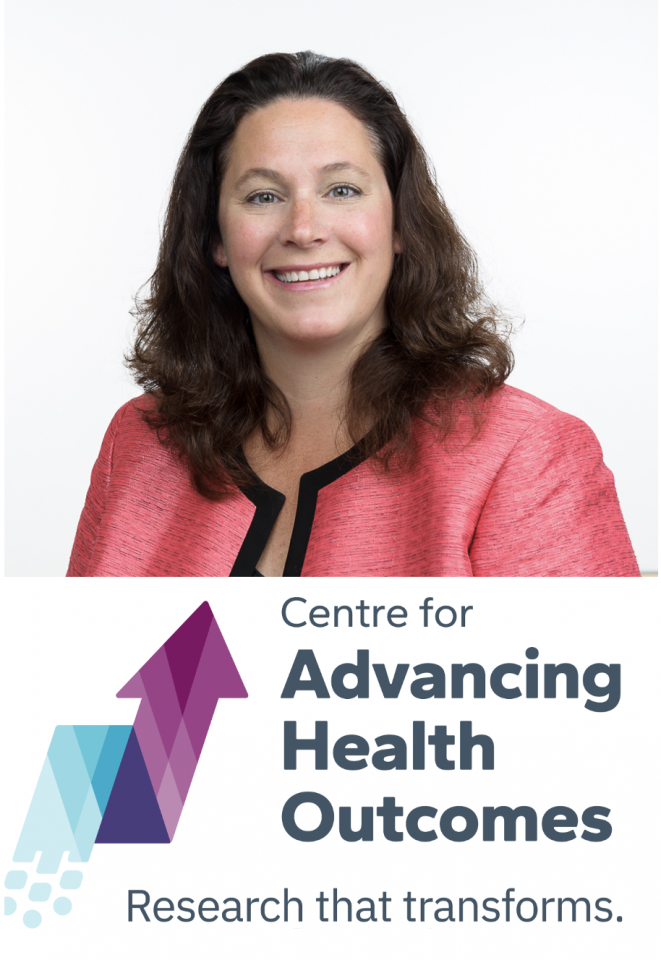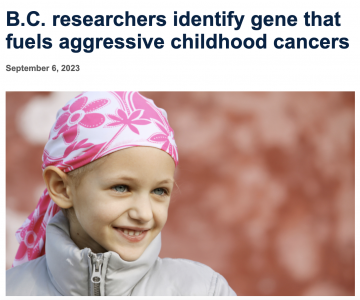Academy of Translational Medicine Event – 27 November 2023 
Centre for Advancing Health Outcomes*: Bridging the Gap Between Data, Research, and Care
*Formerly known as the Centre for Health Evaluation and Outcome Sciences (CHÉOS)
Watch the Recording here (Password: zu1ce@3i)
Speaker: Erin Cherban
Position/Affiliations: Chief Clinical Research Officer, Centre for Advancing Health Outcomes/CIHR Canadian HIV Trials Network, Network of Networks (N2) Board of Directors
Summary: Are you looking for clinical research support services and expert faculty for collaborations? This presentation will provide an overview of the clinical research services, faculty members and programs available at the Centre for Advancing Health Outcomes (formerly the Centre for Health Evaluation and Outcome Sciences, CHÉOS). Additionally, the speaker will provide details about free clinical trial education resources and certifications available to BC researchers and their staff.
Introduction
Established in 1998, the Centre for Advancing Health Outcomes is a group of experienced health outcomes researchers and support staff based at St. Paul’s Hospital. Advancing Health evaluates the effectiveness of health interventions in populations to understand how to improve health and transform health systems for the future.
Mandate
Advancing Health is proud to be recognized as one of Canada’s foremost health outcomes research organizations. Bridging the gap between data, research, and care, Advancing Health is a collaboration between cross-disciplinary scientists and expert research staff. The Centre influences change and improves patient care and health systems by empowering decision-makers to find positive, evidence-based solutions.
In addition to undertaking their own research, Advancing Health is dedicated to providing research support services for both health outcomes research and clinical trials.
The Centre is committed to creating an inclusive, dynamic, and cooperative work environment in which younger researchers are mentored, established researchers are supported, and all participants are encouraged to pursue personal and professional challenges.
Centre for Advancing Health Outcomes Resources for UBC Researchers
Visit the Advancing Health website to learn about navigating the clinical research process and step-wide guides for project development, project set-up, and project execution.
Service Types
Data Management: A dedicated team of data management experts provide a diverse range of data services, including case report form generation, database management, randomization and drug management systems creation, and data entry.
Grant Facilitation: Advancing Health offers a number of services in this area, including budget and methodological consults to help you with preparing your grant submissions.
Health Economics: A team of economists brings a broad range of expertise to support health research including work in the areas of personalized medicine, health technology assessment, pharmacoeconomics, cost-effectiveness analyses, decision analysis, patient preferences, and determining the impact of lost productivity.
KT & Evaluation: They understand the importance of engaging with stakeholders at all levels to enable, promote, and disseminate evidence-based treatment, practice, and policy. The knowledge translation and program evaluation experts will facilitate the uptake of new knowledge and help to ensure the most efficient pathways to your goals and outcomes. Click here for more about communications and KT services.
Project Management: Seasoned research coordinators and project managers can provide study management, monitoring, and recruitment services to ensure the seamless operation of your clinical trial.
Qualitative Research: Advancing Health provides qualitative support at any or all stages of research. Specifically, they provide support services related to study design, confidentiality and privacy, development of data collection tools, data collection & analysis, and manuscript preparation. The staff can also provide support on mixed-methods research that involves techniques to interpret qualitative and quantitative data together, or in succession.
Regulatory Affairs: Advancing Health houses regulatory and QA/QC specialists that can assist with your research start-up and application process. Our experts can deliver guidance on your ethics application, support you with understanding and applying the various regulations from governing authorities, and work to ensure that your research process meets industry standards.
Study Methodology & Statistics: Advancing Health methodologists and statisticians can work with you to support study design and methodological planning, randomization schemes, and data analysis (including developing and carrying out a statistical analysis plan).
Trial Monitoring & Auditing: Advancing Health has certified monitoring personnel on staff who can provide monitoring and auditing services, including the development of monitoring plans, monitoring sites for data quality, and GCP and protocol compliance. We can provide support in the event of a regulatory or sponsor inspection of your clinical trial.
Request Services
Research Services FAQ
Areas of Interest
The areas of interest within Advancing Health are wide in breadth. Learn about the full spectrum of subject areas and disciplines here. The research areas currently highlighted at the time of this presentation include:
Biostatistics: Involves the development and application of statistical principles to the design, analysis, and execution of health research
Cardiovascular Health (ICVHealth): seeks to understand the impact of health care practices and interventions on patient outcomes
Clinical Trials: Advancing Health has a long history of implementing and supporting clinical trials across a range of disciplines
Decision Sciences: Study how people make choices and how they can make better choices using current knowledge, recognizing the presence of uncertainty, complexity, and competing values and trade-offs
Emergency Medicine: Involves the study of services, innovations, and clinical management to prevent emergencies, optimize emergency care, and result in safe transitions to the community
Evaluation: The systematic investigation of the quality or usefulness of a program, project, system, or organization to ensure accountability and/or learning and improvement
Health Economics: An integration of economic theories and methods with health policies, services, and practices
Health Services & Outcomes: The study of the relationships between people and their health care systems and health care providers, and the consequences of those interactions on their health
Knowledge Translation: Facilitates the diffusion of evidence-based innovations into policy and practice
Patient-reported Outcomes: Provide health care providers and researchers with important information about patients’ perspectives on the effectiveness of health care interventions and services
Psychiatry: Focused on examining diagnoses, treatment, and prevention of mental, emotional, and behavioural disorders to advance the understanding of mental illness and influence best clinical practices
Psychosocial Epidemiology: Considers the complex ways in which social factors interact with the psychological and biological determinants of health, particularly in the areas of mental health and substance use
Research in Action: Learn about highlighted projects, access features and research resources, learn about the Works in Progress Seminar Series, and more
Research Resources: Advancing Health has a library of free comprehensive research resources which are constantly being updated, spanning a variety of topics.
Work in Progress Seminar Series: From webinars and virtual events to large symposia and conferences, Advancing Health Scientists and staff play an active role in the local, national, and international scientific community.
Scientists: Advancing Health investigators are at the forefront of major areas of health research. They cross-collaborate to generate a body of evidence that leads to improvements in health and health systems at the local, national, and international levels.
Program Heads: The leaders of the Research Programs are well-renowned experts in their fields. As Program Heads, these researchers foster collaborations with external groups and facilitate research within and between our Programs.
Research Associates: The Research Associates are embedded within the health care system and conduct quality improvement, practise change, and research studies to inform clinical practice and programs.
Leadership: With decades of collective experience working in the health research arena, the Advancing Health leadership group guides the activities and development of the staff departments and the Centre as a whole.
Staff: Staff are the foundation of the Centre’s success. As experts in a wide range of specialties throughout the health research value chain, these dedicated individuals lead the Centre’s research services.
Committees: Advancing Health values the diversity of input from both internal and external stakeholders. Their committees help ensure that the Centre is staying true to its strategic objectives and addressing our organizational priorities.




 Collaborative efforts are a prominent theme in Dr. Sorensen’s success. In November of 2024, Derm-Biome Pharmaceuticals Inc., for whom Dr. Sorensen is CSO,
Collaborative efforts are a prominent theme in Dr. Sorensen’s success. In November of 2024, Derm-Biome Pharmaceuticals Inc., for whom Dr. Sorensen is CSO,  ATM Member Dr. Catrina Loucks has recently been featured in a Precision Health Spotlight. In particular, with Dr. Colin Ross, Dr. Loucks received a 2021/2022 Precision Health Catalyst Grant award, and are researching “Why are some children unable to get pain relief from morphine while others experience excessive sedation or toxicity.”
ATM Member Dr. Catrina Loucks has recently been featured in a Precision Health Spotlight. In particular, with Dr. Colin Ross, Dr. Loucks received a 2021/2022 Precision Health Catalyst Grant award, and are researching “Why are some children unable to get pain relief from morphine while others experience excessive sedation or toxicity.”
 The presentation provided an overview of the clinical research services, faculty members and programs available at the Centre for Advancing Health Outcomes (formerly known as CHÉOS), as well as details about free clinical trial education resources and certifications available to BC researchers and their staff. Thank you to Ms. Cherban for highlighting the comprehensive support that the Centre for Advancing Health Outcomes can provide to those navigating the pipeline of biomedical innovation, as well as to
The presentation provided an overview of the clinical research services, faculty members and programs available at the Centre for Advancing Health Outcomes (formerly known as CHÉOS), as well as details about free clinical trial education resources and certifications available to BC researchers and their staff. Thank you to Ms. Cherban for highlighting the comprehensive support that the Centre for Advancing Health Outcomes can provide to those navigating the pipeline of biomedical innovation, as well as to 


 We are thrilled to announce the successful completion of the workshop on medical devices, a key component of our
We are thrilled to announce the successful completion of the workshop on medical devices, a key component of our